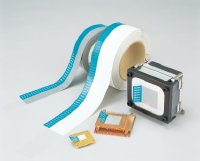Dec 16 2008
Shin-Etsu Chemical Co., Ltd., has developed and begun to market a new type of thermally conductive phase change material (PCM) called the “PCS-LT Series.” Compared to existing PCM, this new product is softer and thus it is easy to bond to substrates and is superior in reworkability.
 Thermally conductive phase change material (type of sheet with pull-tab attached).
Thermally conductive phase change material (type of sheet with pull-tab attached).
In addition, another important characteristic of this new PCM is that it exhibits an exceptionally impressive high-level of heat-dissipation performance even on non-uniform heat-generating surfaces, like that of a multiple chip, because it has enough initial thickness and can achieve suitable bond line thickness even when using low pressure at the time of mounting.
Moreover, in addition to such general PCM characteristics as an exceptional high degree of heat-dissipation effect because of its extremely low thermal resistance and better pliability because it is in sheet form, this new product also has superior long-term reliability and stability – which cannot be obtained from olefin-type PCM - because the product’s base is silicone. It has such desirable characteristics as thermal resistance, cold resistance and good electrical insulation properties. It also has superior resistance to pump-out, the tendency to migrate from the usage area as a result of repeated thermal-expansion cycles, which results in diminished performance.
The main applications for this newly developed product are for the CPU used in PCs, driver ICs in flat-panel displays and electronic control units (ECUs) in automobiles, and this new phase change sheet product is suitable for the thermal protection of various kinds of semiconductor devices. In particular, because this product has superior resistance to pump-out and long-term reliability, it is recommended for devices that have non-uniform structures or warpage.
There are two kinds of standard products, the “PCS-LT-30” and “PCS-LT-60.” Both are double-sided adhesive types. The standard size is 300mm x 400mm and it can accommodate any desired sizes in such forms as pull-tab or roll-type sheets.
The heat-dissipation material is a thermally conductive material that is fitted between the heat-generating unit such as a computer’s CPU and heat sink. The newly developed heat-dissipating phase change material for sheet is a thermally conductive compound consisting of a combination of silicone rubber and a high ratio of thermally conductive filler materials. By fitting these sheets tightly between the heat-generating unit, such as a computer’s CPU, and the heat sink, it is possible to effectively carry heat away to the heat sink.
Demand for thermally conductive silicone rubber materials is expanding for such heat-dissipation applications as in the growing number of electronic components in automobiles as well as in PCs, home appliances, and electronic game units. Moreover, due to the increasing miniaturization and higher performance of electronic devices, the need for more effective heat-dissipation materials is further increasing.
Shin-Etsu has a line-up of various thermally conductive silicone materials such as rubber sheet-types, grease-types, gel-types and adhesive agents. Depending on the application, it is possible to meet various heat-dissipation requirements, and Shin-Etsu will go forward with product development to meet the future needs of a market that will have even more sophisticated needs.
Silicones are highly functional materials that combine characteristics of both organic and inorganic materials. They are materials that provide high value-added features for products in a wide range of industrial fields, including electrical and electronic applications, automobiles, construction, cosmetics and chemicals.